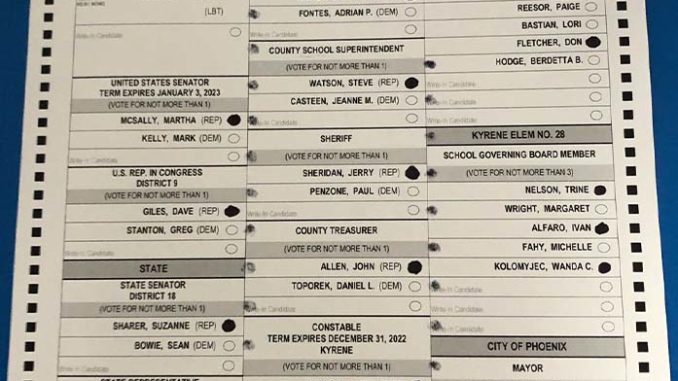
As a judge announced Friday that she will be dismissing the last of several lawsuits challenging Maricopa County’s handling of the 2020 General Election, the county’s board of supervisors were preparing to unanimously certify that all ballots cast were accounted for and every valid vote was included in the election results.
However, whether Friday’s two actions will put an end to legal challenges related to the recent election cycle remains to be seen.
The lawsuit dismissed by Judge Margaret Mahoney of the Maricopa County Superior Court sought a court order allowing county resident Laurie Aguilera to cast a new ballot because she believed the tabulation system might have malfunctioned when she put her ballot in the machine. In addition, Aguilera and fellow plaintiff Donovan Drobina wanted voters to be allowed to observe the review of problem ballots in person.
Mahoney could have ruled first thing Friday morning on motions which sought the dismissal of a lawsuit filed last week by two county voters who experienced problems during in-person voting on Election Day, but the judge first wanted to hear testimony and see what exhibits the attorneys might put forth.
The result was a daylong trial which revealed county elections officials were aware of isolated problems occurring at the county’s 175 voting centers, including some ballots which were printed askew which could not be read by the tabulation machines. There were also voters and poll workers who seemed confused about how to address errors reported by the tabulation machines.
And yes, despite various assurances the last two weeks from Maricopa County officials, it appears some amount of those problems seemed tied to Sharpies bleeding through the ballots. There is just no evidence that those ballots were not accurately tabulated in the end.
But what Mahoney was not presented with was a smoking gun to show that ballots were not properly handled or counted, including those cast by Aguilera and Drobina who took issue with the fact elections officials could not confirm their two ballots were counted properly.
One of the plaintiffs’ arguments is that Maricopa County was statutorily required to provide an electronic voting system which ensures “every vote cast” is accurately counted. That did not happen Nov. 3, attorney Alex Kolodin argued, resulting in hundreds if not thousands of ballots countywide to be reviewed by humans to determine the “voter intent” before another electronic tabulation effort was made.
Mahoney appeared to give a lot of latitude to the attorneys and witnesses in an attempt to get as much relevant testimony on the record as possible. But she spent several minutes during Friday’s proceedings determining whether a software voting system expert called by the plaintiffs could testify about the Dominion Democracy Suites voting equipment.
The expert’s testimony and exhibits were objected to by the Maricopa County Attorney’s Office and the Arizona Democratic Party after it was revealed he did not know what specific design differences existed between Dominion’s 5.5-A model he is familiar with from Texas elections and the 5.5-B model approved for use in Arizona.
He also had not examined Dominion’s 5.5-B, in part because county officials refused to give him permission to do so despite his longstanding work for the Texas Attorney General’s Office election division. In the end the judge allowed him to give some testimony but not nearly as much as the plaintiff’s attorneys had hoped to introduce.
One conciliation for Aguilera is that Deputy County Attorney Emily Craiger conceded during the hearing that county elections officials were willing to acknowledge “that a mistake may have occurred with Ms. Aguilera” but without proof that her ballot had not been counted, those same county officials would be breaking the law if they allowed her to cast another ballot.
Craiger also pointed out to the judge that state law does not allow any votes to be cast after 7 p.m. on Election Day unless the voter is already in line at a voting center or polling station, and that all ballots have been tabulated for several days, so there is no review for Aguilera and Drobina to observe.
Mahoney announced her intent to dismiss the lawsuit with prejudice, meaning the specific allegations cannot be reargued in another case. She also noted that a formal written ruling will be issued in the near future.
Earlier this week another Maricopa County judge dismissed a lawsuit filed by the Arizona Republican Party against county elections officials in an effort to expand a manual hand count audit of ballots cast on Nov. 3. Some legal observers who listened to the hearing in Mahoney’s court suggested afterward that the evidence elicited in this case about errors and uncertainty on Election Day may have been helpful in the hand count challenge.
However, that case was also dismissed with prejudice.
